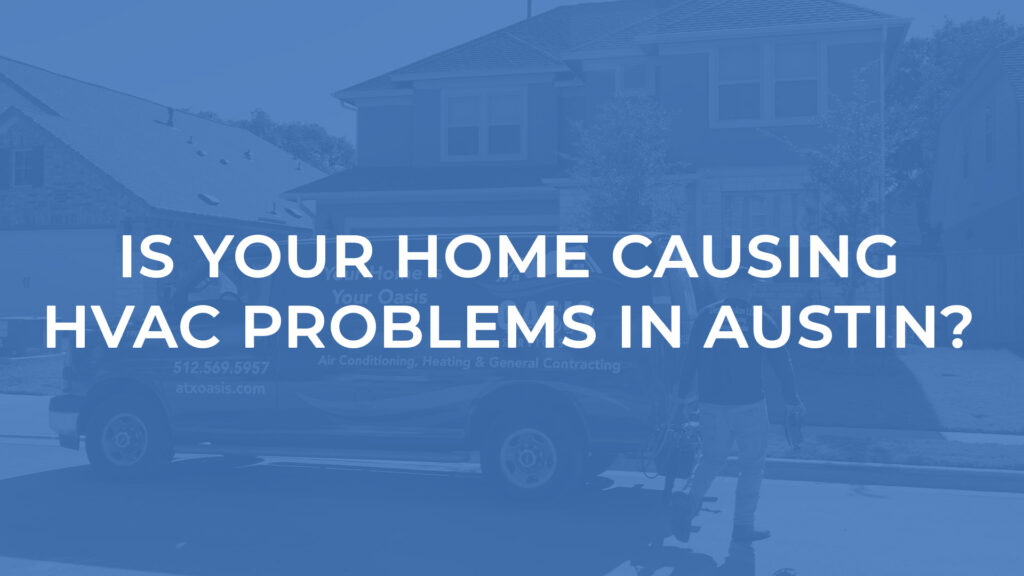Is Your Home Causing HVAC Problems In Austin?
Austin homeowners and businesses should maintain their HVAC systems to stay comfortable and save money on energy. Keeping the HVAC system in good condition is crucial for maintaining a comfortable indoor environment.
It also helps in reducing energy costs. Regular maintenance of the HVAC system is essential for both homeowners and businesses in Austin, TX. It’s a common misconception that the efficiency of these systems solely depends on the machinery itself.
The Importance Of A Properly Sealed Home
However, the structural integrity of the building plays an equally pivotal role. Air leaks, poor insulation, and outdated fixtures can all significantly undermine even the most advanced and efficient HVAC units. Here’s a detailed exploration of why proper sealing is indispensable for HVAC efficiency and the steps you can take to ensure your home or building is optimized for energy conservation.
Understanding the Impact of Air Leaks
Air leaks can be a significant energy drain, forcing HVAC systems to work overtime to maintain desired indoor temperatures. Whether it’s the intense summer heat or the occasional chilly winter in Austin, air leaks compel HVAC systems to cycle on and off more frequently than they would in a tightly sealed home.
How Leaks Affect Different HVAC Systems:
- Single-Stage Systems: These systems operate at full capacity whenever they run. Air leaks can cause these systems to cycle on more frequently, even 24 hours a day, which can lead to significant wear and tear over time.
- Two-Stage Systems: These air conditioning systems can adjust their output to a lower stage when less cooling or heating is needed. However, with air leaks, these systems might find it difficult to operate efficiently at a lower stage, leading to higher operational costs and less comfort control.
- Variable-Speed Systems: Known for their high efficiency, these systems adjust their output to precisely match the heating and cooling demands. Air leaks undermine this precision, forcing even the most advanced systems to operate in higher modes more frequently, which diminishes their efficiency and leads to increased energy consumption.
The Usual Suspects
While there are a wide range of sources of air leaks in your home, there are a few common components that play a role in the inability of your AC system to cool or heat efficiently.
Doors and Windows
Ineffective doors and windows are often the primary sources of air leaks in a home. It makes sense too because these two components get used daily and often, we’re rough on them.
As they age, their ability to seal off the interior from external temperatures diminishes, making them key targets for upgrades.
Modern energy-efficient windows are often double or triple-paned and feature inert gases like argon or krypton between the panes, which greatly reduces thermal transfer. New doors and windows not only seal better but also provide improved insulation, thereby enhancing the overall thermal efficiency of the home.
By upgrading, you can ensure that your #1 Austin HVAC team isn’t having to replace your system prematurely due to strain. In a well-sealed home, your system doesn’t have to compensate for air leaks, thereby maintaining efficiency across every season.
Baseboard and Trim Sealing
It’s not just the obvious gaps around doors and windows that can impact HVAC efficiency. The junctions where different building materials meet can also allow unwanted air exchange.
- Importance of Sealing Baseboards and Trims: Properly installed and caulked baseboards and trims can significantly reduce air leakage. Ensuring that these elements are perfectly aligned and sealed not only prevents air from escaping but also blocks outdoor air from entering, which can be especially beneficial for homes with two-stage or variable-speed HVAC systems, as it allows these more sophisticated systems to operate at peak efficiency by maintaining stable indoor environmental conditions.
Insulation: Your Hidden Ally or Enemy
Proper insulation is crucial in maintaining a regulated temperature within a building. As insulation ages, its effectiveness can decrease, thereby subtly reducing the efficiency of any HVAC in Austin.
- Upgrading Insulation for Enhanced HVAC Efficiency: New or upgraded insulation can help maintain uniform temperatures throughout a building, decreasing the need for the HVAC system to cycle excessively. This is particularly important in buildings with advanced HVAC systems, as consistent insulation helps these systems operate more efficiently at their lowest stages, extending their lifespan and reducing overall energy costs.
Additional Tips for Sealing Your Home
Enhancing your home’s sealing involves more than just upgrading windows and doors or sealing leaks. Here are some additional steps that can be taken:
- Weatherstripping: This simple addition can make a significant difference in homes with single-stage systems by preventing short cycling.
- Seal Ductwork: Duct sealing is critical in all types of systems to prevent loss of conditioned air.
- Door Sweeps: These are essential for preventing air from escaping under doors, particularly in homes with variable-speed systems where even minimal leaks can disrupt system efficiency.
- Window Treatments: Thermal curtains can provide an additional insulation layer, helping to maintain the efficiency of two-stage and variable-speed systems.
- Proper Ventilation: It’s crucial to balance sealing efforts with adequate ventilation, especially in kitchens and bathrooms, to prevent moisture-related inefficiencies and maintain air quality.
Get The Most From Your Air Conditioning In Austin
Ensuring that your home or building is properly sealed is as important as selecting the right HVAC system in Austin.
By addressing areas such as windows, doors, baseboards, and insulation, homeowners and businesses can significantly improve the efficiency of their HVAC systems.
These upgrades not only enhance comfort and reduce energy consumption but also extend the lifespan of the HVAC system itself. With the right sealing techniques, your HVAC system can operate at its theoretical efficiency.
If you need help keeping your home comfortable year-round, contact Oasis Services. We’re honest, transparent on pricing, and reliable. Contact us today!



